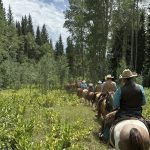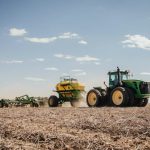Unusual farm purchase

Within our group of old geezers who gather twice a day to convene a gabfest and guzzle coffee, the topics of conversations run the gamut — from popcorn to politics, from history to hair-balls, from sports to shooting the bull, from old cars and trucks to old, achy knees.
Well, recently the conversation one afternoon turned to the price of farmland changing hands across the U.S. Several guys pointed to recent farmland sales that were in the stratosphere compared to the land’s ability to turn a production profit.
That’s when one conversationalist broke in and said, “Yep, it’s a far cry from a farm sale that happened in our family way back in the Great Depression.”
He went on to say that this farmland sale happened near Waynoka, Okla., sometime in the 1930s. There wuz a quarter-section of land that the far-distant relative wanted badly to own.
But, as was the norm in the Great Depression, cash money wuz hard to come by and bartering for many necessities wuz a common practice. So, after considerable hassling over the barter detail between the two parties, they reached a barter deal agreeable to both.
The kinsman gave the landowner a wagon load of alfalfa seed, the wagon it was in, and a team of nice mules to pull it. The landowner handed over the deed to the quarter-section.
Since that time, that farm has been handed down through several generations. And, the story has been retained and retold within the family for the same amount of time.
At first glance, that farm barter seemed to not have much value. But, then our group considered how much time and effort it took in the 1930s to combine a wagon-load of alfalfa seed and the value of a good team of work mules.
***
Statistics reveal that farming and ranching are always close to the top as the most dangerous of ways to work for a living. And, just looking at elderly agriculturists will show a sad number of them are missing a body part or living with a maimed one. And, we don’t see the ones that a fatal farm accident took from us.
But, the counter side of those high farm accident statistics is that many lucky agriculturists live severe-accident-free for all their long and productive lives.
The following is a supposedly true story about a one of the luckiest of those long-lived farmers. He long ago joined the “Big Farm” in the sky.
His name wuz ol’ S. Kipp deFahls, or just plain “Skip” to his friends. He wuz mainly a grain farmer, but he had a side bizness of doing earth-moving and tree-clearing jobs with his caterpillar.
Ol’ Skip wuz the hard-driving, type-A personality. He worked hard, but at the same time never missed an opportunity to work smarter, too — even it it meant taking a personal risk.
The following wuz a prime example of his calculated risk-taking. If Skip needed to move both his caterpillar and his pickup to another location on a big parcel of relatively level land he wuz working on, here’s how he did it in one trip.
First, he aimed the caterpillar toward the location he wanted to move. Then he put the caterpillar into a low gear and throttled the motor down to just a crawl. Then, as soon as the caterpillar started to move, Skip nimbly stepped off onto its moving track and hopped to ground.
Then he trotted back to his pickup and followed close behind the caterpillar as it crawled across the land. Then, when the two-vehicles got close to his desired destination, Skip shut the pickup off, quickly got out and trotted up to the rear of the still-moving caterpillar. Then he expertly put a foot on a rotating cleat of the caterpillar track and rode it up to the cab and hopped into the cab and shut the rig down. It wuz a time-saving trick that worked safely for Skip all his life.
However, the accident stats indicate that Skip might have been luckier than smart.
***
My 2025 gardening came to an end with the first late frost. All in all, I’d rank this year’s gardening results as among the best ever. For the first time in my life, I ate fresh-picked peas and new tomatoes in November. I’m still eating vine-ripened tomatoes. All the dried beans are shelled and vacuum packed. The pantry and freezer have lots of canned and frozen veggies in them.
All the frosted vegetation is now in my compost pile. All that’s left to do is put away the hoses and stash the tomato cages for the winter. Hope I’m healthy enuf to do it all again next year.
***
Last week I ended my column with three “Debbie Downer” depressing limericks about “problems” I see in American life. Well, pessimism ain’t really my bag. I prefer optimism.
So, for my column’s “wise words” this week, here are the upbeat lyrics to a song my beloved maternal grandmother, Anna Johanna, wrote back in the 1950s. It’s title is “Happy Go-Lucky Me.”
***
Happy Go-Lucky me.
I go around a’singing.
Happy Go-Lucky me.
Don’t know what tomorrow is bringing.
I can see happiness
Once more at my door.
It just came a’knocking
Like it did before.
When I thought that I was down and out,
I still kept my head up.
Didn’t know what it was all about.
At times I was quite fed up.
With troubles. Then double troubles.
But then the sun came shining through.
Never let yourself down.
Wear a smile, not a frown.
It’s the best thing to do.
***
Have a good ‘un.









